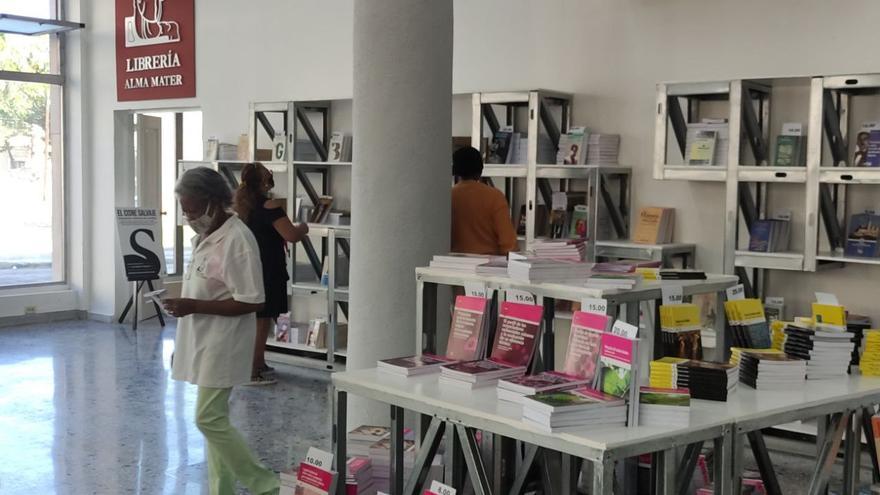
![]() 14ymedio, Juan Diego Rodríguez, Havana, 7 February 2022 — The best-selling book in the Alma Mater bookstore, recently reopened in Havana, is not Capital or some title by Marta Harnecker, but Homer’s Iliad.
14ymedio, Juan Diego Rodríguez, Havana, 7 February 2022 — The best-selling book in the Alma Mater bookstore, recently reopened in Havana, is not Capital or some title by Marta Harnecker, but Homer’s Iliad.
Located in a small corner of the premises, where most of the customers gathered on Monday, the Greek classic appeared with other greats of literature, such as Pere Goriot, by Honoré de Balzac, or La casa de Bernarda Alba, by Federico Garcia Lorca.
“Oh, but how has this book sold!” said the shop assistant to one of the young men who was carrying a copy of the Iliad under his arm. “Outside of that, there is very little of interest,” confessed the customer.
The price of these international titles, between 10 and 15 pesos, also favored their purchase, despite the fact that their edition is of very poor quality. “The other propaganda books have a more elaborate cover, and even then nobody buys them,” joked another buyer, in his 50s.
In the rest of the shelves, “educational texts” multiply, with the words “Che” or “Fidel” on their spines. “Don’t you have The Golden Age?” another young woman in her twenties asked about a title by José Martí. “We don’t have it yet but we are going to have it, at the end of the month or the beginning of March,” assured the shop assistant.
The bookstore, located on the corner of Infanta and San Lázaro, was reopened this Sunday, after being closed for more than a year and under construction. A chronic clogging problem, linked to the flow of sewage from the upper floors of the building, had flooded the basement and affected the structure.
Alma Mater, which owes its name to its proximity to La Colina university, has in recent years also been a navigation room for the national intranet and a hall for official events. However, for taxi drivers and those over 70, this business with the glass windows that serve as a reference to so many are still referred in the old way: Lámparas Quesada, the private business located on the site before 1959.
On the afternoon of January 27, shortly before a crowd passed by as part of the official March of the Torches, the residents of the area murmured that the opening was imminent and was destined to please the eyes of Miguel Díaz- Canel and Raúl Castro, both in the front row of the parade.
However it couldn’t even be made ready for the occasion. There was barely time to create a set of furniture and lights. “What they did was put some furniture in the middle of the salon, to make it appear that there was something, because there was nothing else,” says a local resident sarcastically. “In case el designado [the hand-picked president] arrived or looked through the glass when he passed by.”
During the reopening event, this Sunday, with the presence of several Communist Party officials and academic authorities, it was announced that 186 titles, 36 issues of academic journals and 300,000 copies of more than 22 Cuban publishers are for sale at the store.
Amanda García Roche, director of Academic Publications and of the University of Havana Publishing, which manages the bookstore, praised the “reunion with a space that we all profess much love for and missed” and assured that it “reopens completely restored,” although the haste to meet a date raises fears that this may not be the case.
The act, full of solemnity, included several speeches, dozens of chairs placed in the nearby Martyrs’ Park and a security operation that left the residents of the neighborhood without the chance of buying “not even a button” in the informal market until that the enchanted visitors left. The cutting of a white ribbon sealed the umpteenth reopening of the premises.
“Here they have given a few coats of paint, fixed the lights and started selling, but we have doubts about how long it will last until the shit comes out from under the door again,” questions a neighbor who lives above the nearby Cuban Post Office of and who passes every day in front of the bookstore.
The furniture that has been placed in the spacious living room seems to be a prop. “They are like the ones used in some television programs,” a young man who came to review the titles for sale sneered this Monday. The metal shelves, attached to the walls, and some in the center were few relative to the large room, whose floors had been polished so much that more than one person slipped.
From this February 6, the collective exhibition of posters of The Wild Swan, inspired by the verses of Luis Rogelio Nogueras Wichy, and carried out by Visual Communication students of the Higher Institute of Design, will also be exhibited in the bookstore .
Among the most repeated titles is the magazine Economy and Development, published every semester by the Faculty of Economics of the University of Havana, but it does not seem to arouse much interest in these times of crisis, inflation and the loss of purchasing power of thousands of Cuban families.
____________
COLLABORATE WITH OUR WORK: The 14ymedio team is committed to practicing serious journalism that reflects Cuba’s reality in all its depth. Thank you for joining us on this long journey. We invite you to continue supporting us by becoming a member of 14ymedio now. Together we can continue transforming journalism in Cuba.
